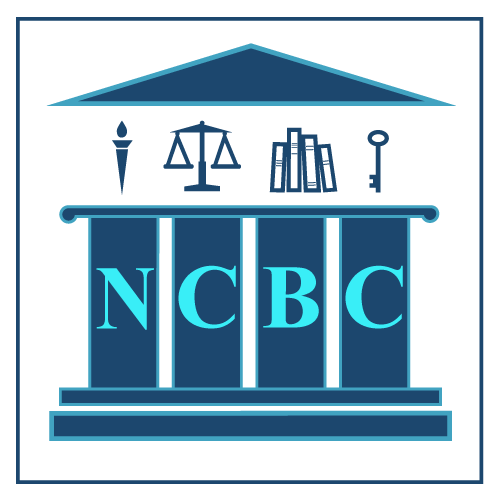NCBC 2019
Breakout Sessions
A Motion to What? Bankruptcy Law Made Easy…or Your Money Back! – Thomas Kearns
and Mark Neal
This is an introductory level class on bankruptcy law that will provide attendees with a better
understanding of the Bankruptcy Code and procedural rules and how they impact what we do in
the Clerk’s Office. We will explain what bankruptcy does for debtors and creditors, why it is so
powerful for consumers in CH 7 and CH 13, what actually happens in a CH 11 case, why notice
is so important, and a host of other topics we are sure will keep attendees on the edge of their
seats. While it is aimed at case administrators and other non-legally trained court personnel,
anyone with an interest in bankruptcy law may find it informative.
Action! Lights, Camera…Cellphone? Creating Video on Your Mobile Device – Barry
Lander, Mohung Wong and Hanna Ortiz
Making a video should not be an intimidating experience. Sure, it is nice to have a professional
crew and a studio with top-notch equipment, but what if it’s not an option and you still must film
a quick video for your court? During this session, we’ll turn your iPhone/iPad or Android device
into a rapid studio and learn the quick and dirty of video production. We’ll cover top 10 tips for
mobile video capture, go over basic principles of capturing light and sound, and discuss simple
editing and publishing options. We'll screen some local court examples to illustrate lessons
learned from both successful, and, not so successful efforts to use video for messaging and
learning. Bring your fully charged device and your creative attitude.
Court Access to NewSTATS Data – Erin Short and Fay Cheung
The AO's Judiciary Data and Analysis Office will soon provide to bankruptcy courts access to
NewSTATS data through Business Objects. This access to NewSTATS data will allow court
staff to generate reports with data as of their last transmission to the AO. The session will explain
the reports that will be available, as well as a demonstration of how users will access and run
reports.
Cultivate a Personal Growth Mindset – Stephanie Hemmert
“Fixed mindset” and “growth mindset” are terms coined by Stanford University psychology
professor, Carol Dweck. Which have you had? A fixed mindset may be what stops many of us
from improving ourselves. This session will identify what it means to have a growth mindset and
will discuss possible benefits of cultivating a growth mindset. We will explore benefits both
from a person’s individual perspective and from a manager’s perspective for motivating and
developing direct reports. This session will help participants expand their knowledge and skills
in being quality-driven, problem-solving, and their personal and professional development. By
the end of this session, participants will accomplish: identify what it means to have “fixed” or
“growth” mindsets; explore the possible benefits of a growth mindset; and describe strategies for
cultivating a personal growth mindset in oneself and, if a manager, encouraging one in team
members.
Dark Web/Cyber Crime – FBI (Chicago)
Members of FBI Chicago's Cyber Task Force will discuss facts and rumors surrounding the Dark
Web, from the Tor browser required to access it, to dark web marketplaces and hidden services,
to the cryptocurrencies believed by many to anonymize purchases.
Decision-Making: The Military Decision-Making Process for Everyday Use – Kyle George
Military units are required to make all sorts of decisions, on both major and minor scales. An
ingrained aspect of decision-making in the military is the "Military Decision-Making Process."
This is a deliberate decision-making process originally designed for larger units, but its
application on the small scale, even at the individual level, is useful in everyday decision-making
whether you are in a court unit, a civilian organization, or if you're trying to decide the best
laptop computer to purchase! Participants in the presentation will get an overview of what steps
are involved in the process and how it's applied to everyday decision-making. Emphasis will be
placed on developing and analyzing courses of action - the "rubber meets the road" of the
decision-making process. Participants will also come away with handouts they can refer to that
will aid them in their future decision making, and in communicating decisions to others.
Effective Listening Skills – Phyllis Drum
While you may think you’re a good listener, are you really? This session will examine the
reasons it’s important to listen, the steps we can use to be more effective listeners, and skills to
improve understanding of what we hear. This session will help you expand your knowledge and
skills in customer service, communication, and problem solving.
HR Topics
Description Coming Soon.
Instantly! Improve Your Memory – La Tia Sanders Terrado and Mike Rockland
Instantly! Improve Your Memory is based on cognitive studies that show your memory can be
effectively utilized by using imagery rather than simple memorization. The course teaches
memory by using techniques such as mnemonics, association and mental visualization. This
highly interactive course discusses the science behind the memory method, a demonstration, and
step-by-step instruction of how to use the memory skills. At the end of the course, participants
will have the opportunity to demonstrate their improved memory. The skills attained in this
course can be utilized both personally and professionally. Discover how to use your brain to
more effectively enhance memory skills.
JIFMS Communications, Tips and Upgrade Path – ASO and FPO Team
Come hear about our plans for knowledge exchange, best practices surrounding vendor record
management and top help desk tickets, as well as all future upgrades.
Keys to Effective Communication – ILNB Staff
Communication is essential for getting things done in the work place. It is a skill critical to
getting your peers and subordinates on the same page to reach a common goal. Learn about
obstacles to getting your point across and how to avoid them in this engaging and captivating
workshop.
Leading with Your Strengths – Beverly Griffeth-Bryant
As you sit at your desk, and you look across the horizon of your court unit, your agency, you
ponder assuming a leadership role. As you look at those who lead in your agency or court unit,
you see “titled” leaders, and you see leaders who “lead from their chair.” While these are two
types of leadership roles, and while you are not sure which role you would like to assume, you
understand that leadership self-development will be necessary. Leadership development provides
for the emerging leader an important understanding, and appreciation of one’s talents. Everyone
has innate talents that are unique and demonstrate how each person thinks, feels and behaves.
Gallup the leader in talent to strength development created the CliftonStrengths assessment, to
help everyone begin their journey discovering their talents, and the process to transform them
into strengths. The best leaders know what they are good at and dedicate hours getting better at
what they best. The best leaders don’t imitate or attempt to make themselves well-rounded, and
they manage their weaknesses. If you desire to become a leader, and you have taken the
CliftonStrengths assessment, this breakout session is for you. Register for this breakout session,
print out your Strengths Insight Report and join the coach in this breakout session. During this
session we will discover who you are naturally and learn how to leverage your leadership
strengths to lead building trust, compassion, stability, and hope.
Meet Smart: Making Meetings Productive, or Fewer Meetings, More Meetings – Woody
Parks
Too many meetings yet not enough communication -- does that sound like your office? Planning
and conducting meetings is a critical skill for court employees, yet few have trained in the
subject. We will consider how and when to conduct meetings; whom to invite or exclude; and
how to recognize the most important part of every meeting. This workshop is based upon
extensive research in the best methods of conveying information, in or outside of a traditional
meeting setting. It is an interactive, engaging, and fun way to change your workplace meetings
forever.
Microsoft Work 2016 Top Ten Tips – Lois McLeod
Presentation will include a demonstration of functions most needed to do our work, including
automating tools, converting documents, customizing options, and formatting efficiencies. There
will also be time for Q&A.
NextGen and Implementation Update – Gary McCaffrey, Nick Gomez/NextGen Live
Courts
Description Coming Soon.
Outlook 2016 – Karen Scales
Presentation will include a review of the Mail, Calendar, and Contacts modules of Outlook. Key
components of the interface are covered, in addition to details on various features and functions
needed in our daily work.
Personal Online Information – Causes and Cures – Amy Bennett
It's a normal Saturday. You surf the web, post a photo online, send a few e-mails and texts, use
your phone to navigate, shop for a dress, hit the grocery store on your way home, and buy an ebook
and read it on your e-reader. Every action is potentially tracked, recorded, and sold to some
consumer of information - generally aggregated with other data automatically pulled from public
and commercial data bases (property records, voting registration, online maps). Targeted
marketing is irritating. Identity theft is serious. Stalking is scary. Some of the information we can
limit by managing our devices and applications. Some of the information we can control by
opting out and monitoring our critical information. This is a basic overview of how we provide -
deliberately and unconsciously - information, how it can be used by third parties, and some
options for monitoring and managing it.
Phishing - Don’t Take the Bait! – Joshua Glovinsky
With major compromises occurring more and more frequently and Phishing being the most
common attack vector, it is important to train end users to recognize phishing attacks. This
course will show end users how to identify and report phishing schemes.
Planning for a Successful Retirement – Albert Succi
This presentation will help employees planning to retire understand where the Administrative
Office's responsibilities begin and end, and at what point the Office of Personnel Management
takes over. This presentation attempts to provide for a smoother transition from employee to
retiree and alleviate much of the uncertainty and stress that comes with this new phase in life.
Participants will also receive information regarding employee responsibilities and who or where
to turn to when questions arise.
Put the Fun in Fundamentals! – Richard Marshall
Do you and your colleague tremble at the words “mandatory training?” Do you mentally check
out the minute an instructor begins to speak? As an instructor, do you dread presenting the same
boring material in the same boring way? This session will look at the many ways that trainers
can make the learning experience not only more fun, but more effective. We will share tips and
tricks, from using videos to incorporating games, to improve the classroom experience. We
discuss how to avoid turning the learning environment into simple entertainment, one with no
knowledge or skills being developed. This session will help you expand your knowledge and
skills in communication, presentation, and fostering a positive learning climate. By the end of
this session, you’ll be able to: discuss the difference between education and entertainment;
connect fun exercises with learning objectives; incorporate humor into content; use games to
further knowledge and improve skills; design interactive lectures; use videos to reinforce
content; and apply crowdsourced techniques for making learning fun.
Reframing in Leadership – Choice, Collaboration, and Change – Audrey McKenna
A frame is a mental model, map, mind-set, schema and cognitive lenses… frames are windows,
tools, lenses, orientations, and perspectives. Bolman & Deal identify four frames of thinking that
individuals operate under. These frames are: Structural, Human Resource, Political Frame, and
Symbolic Frame. To begin the presentation a brief self-assessment will be taken to allow
participants to see which frame of thinking they dominantly exhibit. A brief overview will be
given about the traits and assumptions of each frame, and strengths and benefits. From there,
discussion will be presented on why it is important to step outside your dominant frame and
restructure your thinking to become a more effective manager or leader in your profession. By
the completion of this presentation it is expected that participants can be more self-aware of the
mental models, mind-sets, orientations, and perspectives in which they exhibit. Through this selfawareness
managers and leaders gain the ability to adapt better to their employees and/or
followers to better understand, develop, meet other’s needs, and foster teamwork.
Retirement Planning: Projections vs Reality – James De La Torre
Planning for your retirement is more than knowing your monthly income, it is about
understanding the challenges you may face and ways to plan around them. Retirement planning
includes investments like the TSP and developing a strategy to evaluate and implement a
successful withdrawal strategy. This program looks at the new TSP withdrawal provisions and
how they will affect you. In this class we will review your sources of income, look at ways to
determine retirement readiness and outline the biggest threats to your future in retirement. This
class is intended to educate participants who have less than 10 years before they are eligible to
retire.
SharePoint – Gary Yakimov
To the Point - Get Ready to Share (and Collaborate) - This session will provide users information
regarding the upcoming deployment of SharePoint Online including its capabilities,
implementation status, pilot efforts to date, training and communications plans, and discussion of
what courts can do to prepare to utilize SharePoint Online and maximize its effectiveness.
Taking Control of your Finances – James De La Torre
This class is designed to help individuals strengthen their financial future by adopting key steps
in the financial planning process. Through cash management, investment and retirement
planning this program can help you develop realistic goals to overcome common roadblocks we
face every day. It focuses on the importance of discipline in saving money and examines how to
maximize your FERS and TSP pensions. This class is intended to educate and motivate
participants who have more than 10 years before they are eligible to retire on the importance of
putting their money to work to build a healthy nest egg.
Talent Tuesday, LIVE! – Beverly Griffeth-Bryant
Talent Tuesday LIVE! For the last several years, the Strengths Champions of the Northern
District of Illinois have held a monthly WebEx learning series, titled “Talent Tuesday,” in their
efforts to keep the CliftonStrengths conversation alive in their court unit and throughout the
judiciary. Well, since the conference will be in Chicago, how about inviting those attending the
conference, to join us LIVE as we “continue the CliftonStrengths conversation.” This interactive
breakout session will allow the NCBC attendee to interact and speak with our Strengths
Champions; to discover, discuss and develop your CliftonStrengths. You won’t want to miss this
breakout session, to hear the stories of those who have discovered who they are naturally, and
how they have transformed those into strengths at work and in life.
The Benefits of Having a Strong Professional Relationship Between the UST and Clerk’s
Office – Patrick Layng and Adam Brief
Consistent and overlapping missions guide the UST’s Office and Clerk’s Office. The work of
both agencies is geared toward enforcing the law, providing justice and public service for all
constituents in the bankruptcy process. That means there is a lot of opportunity for the agencies
to assist each other. In this session, we want to focus on how to identify and maximize those
opportunities; how to sustain the relationship, and finally, highlight some benefits that we have
experienced through our relationship with the Clerk’s Office in the Northern District of Illinois.
This session will include topics such as Bankruptcy Petition Preparers (BPP) and Frequent Filers.
These lessons are not “region” specific.
The Inner Workings of the BNC – Joe Speetjens and Shannon Buzzard
Representatives from the Bankruptcy Noticing Center (BNC) will reveal the magic behind the
noticing process with a look at recently added and planned capabilities and services. We will
provide a behind the scenes look at the print operations and answer all your questions.
The Power of Empathy: The New Superpower – Julie Owens
Empathy, not strength, is Superman’s greatest superpower. Why? Because it allows him to
understand what others are thinking and feeling to help them. An empathetic workplace has a
positive impact on productivity, reliability and commitment. Empathy is the ability to wear
someone else’s shoes or cape and be aware of their feelings and understand their needs. By
improving your ability to listen and understand, empathy can be your new superpower. You will
learn about how to better understand your co-workers and others. A cape will not be included
with your new superpower, but you will be able to develop and improve relationships which in
turn will make for a more enjoyable and productive work environment.
Too Much of a Good Thing? How “Positive” Behaviors Can Become Bad Habits – Richard
Marshall
This session will examine some behaviors exhibited by successful professionals, and how those
behaviors may hold them back in their career. Using a best-selling book by executive coaching
guru Marshall Goldsmith as a starting point, we will discuss these behaviors in the court
community, and how court employees can identify which behaviors they may unknowingly
exhibit. We will also discuss ways to eliminate these behaviors, or lessen their impact, and
engage in some interactive exercises meant to improve our ability to self-assess our actions. This
session will help you expand your knowledge and skills in collaboration, communication,
interpersonal savvy, and self-development. By the end of this session, you’ll be able to: identify
“bad habit” behaviors commonly demonstrated by successful people; discuss effects of these
behaviors on the individual, the team, and the organization; identify behavior changes you would
like to make; discuss strategies for reducing or avoiding overusing these habits.
Transitioning to Outlook and Office 365 – Ron Blankenship and Connie Porzucek
SDSO leaders will share lessons learned from deployments of Office 365 and email migrations
from Lotus Notes to Microsoft Outlook. Ensure a smooth transition for your court by learning
what went well for the courts that have completed the migration, and what recommended steps
you can take now to improve the process.
Understanding Court Security and Court Security Funding – Mark Hartz
This course will provide NCBC members an understanding of who protects the federal Judiciary
and how that protection is funded. The material will cover court employee's responsibilities on
Facility Security Committees (FSC) and Court Security Committees (CSC)and an understanding
of the Interagency Security Committee's (ISC) process for protecting federal facilities.
What Customers Really Want – Phyllis Drum
This session will explore the idea of extraordinary customer service. It focuses on the importance
of customer service at work for both internal and external customers. We will explore how staff
can staff build rapport with customers and remain calm in tense situations. This session will help
you expand your knowledge and skills in customer service, communication, and problem
solving.
When - The Importance of Timing – Stephanie Hemmert
At NCBC, we often use the opportunity to discuss the latest ideas recently offered, especially in
books recently published. This session will provide space to talk about the research-based
concepts of the importance of timing in Dan Pink’s latest book, “When,” and Michael Breus’
book, “The Power of When.” Together we’ll explore topics such as looking at our best
productive times throughout the day to looking at timing of big events in our life. This session
will help participants expand their knowledge and skills in flexibility, problem solving, and selfdevelopment.
By the end of this session, participants will accomplish the following: explore
highlights from the books “When” and “The Power of When” by following their curiosity; gain
knowledge from researched findings on timing; and brainstorm ideas in applying these concepts.
Who’s Behind the Curtain? – Judge Romero and Ken Gardner
Ever wonder how policies get developed and implemented, and how that impacts your court?
How about how our court budgets are decided? Or, how many Authorized Work Units did your
court receive this year? Why are we getting rid of space? Why are we converting to NEXTGEN?
What’s up with IT security? How can we get another judge? Why are some courts consolidating?
Why are some Judiciary policies not the same as Executive Branch policies, but others are? If
you have ever asked yourself any of these questions, this is the class for you! This course will
provide an in-depth look at how the judiciary develops policies and operates, from the
perspective of Chief Judge Michael Romero and Clerk Ken Gardner. Before you yawn, in this
interactive and somewhat comedic poke about life in the federal judiciary, Romero and Gardner
will dissect and explain how Judicial Conference Committees develop and implement policy
decisions, and how the Chief Judge and Clerk work together to implement them at the local
level.





